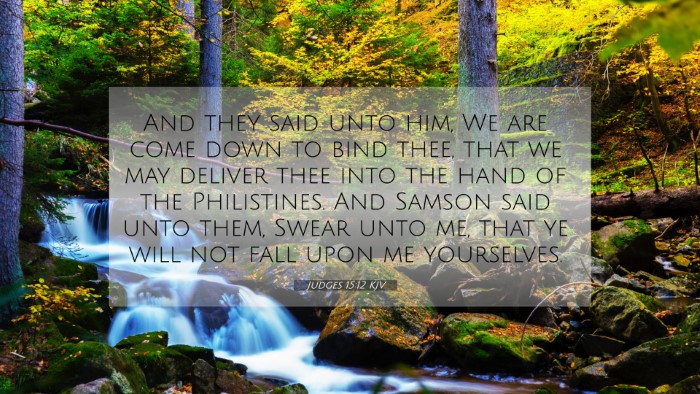Old Testament
Genesis Exodus Leviticus Numbers Deuteronomy Joshua Judges Ruth 1 Samuel 2 Samuel 1 Kings 2 Kings 1 Chronicles 2 Chronicles Ezra Nehemiah Esther Job Psalms Proverbs Ecclesiastes Song of Solomon Isaiah Jeremiah Lamentations Ezekiel Daniel Hosea Joel Amos Obadiah Jonah Micah Nahum Habakkuk Zephaniah Haggai Zechariah MalachiJudges 15:12 Similar Verses
Judges 15:12 Cross References
And they said unto him, We are come down to bind thee, that we may deliver thee into the hand of the Philistines. And Samson said unto them, Swear unto me, that ye will not fall upon me yourselves.
Uncover the Rich Themes and Topics of This Bible Verse
Listed below are the Bible themes associated with Judges 15:12. We invite you to explore each theme to gain deeper insights into the Scriptures.
Judges 15:12 Cross Reference Verses
This section features a detailed cross-reference designed to enrich your understanding of the Scriptures. Below, you will find carefully selected verses that echo the themes and teachings related to Judges 15:12 KJV. Click on any image to explore detailed analyses of related Bible verses and uncover deeper theological insights.

Judges 8:21 (KJV) »
Then Zebah and Zalmunna said, Rise thou, and fall upon us: for as the man is, so is his strength. And Gideon arose, and slew Zebah and Zalmunna, and took away the ornaments that were on their camels' necks.

1 Kings 2:34 (KJV) »
So Benaiah the son of Jehoiada went up, and fell upon him, and slew him: and he was buried in his own house in the wilderness.

1 Kings 2:25 (KJV) »
And king Solomon sent by the hand of Benaiah the son of Jehoiada; and he fell upon him that he died.

Matthew 27:2 (KJV) »
And when they had bound him, they led him away, and delivered him to Pontius Pilate the governor.

Acts 7:25 (KJV) »
For he supposed his brethren would have understood how that God by his hand would deliver them: but they understood not.
Judges 15:12 Verse Analysis and Similar Verses
Bible Verse Analysis: Judges 15:12
Judges 15:12 states, "And they said unto him, We are come down to bind thee, that we may deliver thee into the hand of the Philistines." This verse is pivotal in understanding the tension between the Israelites, personified here by Samson, and their oppressors, the Philistines. The following analysis draws insights from several public domain commentaries, encompassing theological and contextual interpretations.
Contextual Overview
The Book of Judges illustrates a tumultuous period in Israel's history, marked by cycles of sin, oppression, repentance, and deliverance. Samson, a Judge endowed with remarkable strength, faces betrayal from his own people as they find themselves trying to appease the Philistines who are powerful adversaries.
Commentary Insights
-
Matthew Henry:
Matthew Henry highlights the disheartening reality that the Israelites, unfortunately, demonstrate a willingness to collaborate with their enemies rather than stand firm against oppression. The request to bind Samson underlines their fear of the Philistines and their lack of faith in God’s ability to protect and deliver them.
-
Albert Barnes:
Barnes focuses on the implications of the Israelites’ actions. He explains that this moment serves as a stark reminder that compromise with the enemy often leads to betrayal of those who are meant to lead God's people to deliverance. Samson's bondages symbolize the spiritual bondage that can occur when alliances are formed out of fear.
-
Adam Clarke:
Clarke interprets the dialogue in this verse to show the conflicting motivations of the Israelites. Their intent to deliver Samson to the Philistines is portrayed as misguided adherence to superficial peace at the cost of their true strength found in God’s anointed. This highlights the dire consequences of internal division among God's people.
Cross-References
Judges 15:12 connects to various other biblical passages that enrich our understanding of its themes. Below is a list of significant cross-references:
- 1 Samuel 10:5 - Discusses the prophetic role and the Spirit of the Lord descending upon leaders in Israel.
- 1 Samuel 13:19-22 - Highlights the oppression Israel faced and the need for deliverance.
- Psalm 118:10-12 - Expresses the sentiment of trust in God over human alliances.
- Isaiah 8:12-13 - Warns against fearing what others fear and emphasizes the fear of the Lord.
- Matthew 26:56 - Illustrates betrayal among Jesus' closest followers, paralleling the betrayal Samson faces.
- Galatians 6:1 - Speaks to the importance of supporting and restoring fellow believers instead of binding them with fear.
- John 15:13 - Refers to the ultimate sacrifice and the significance of love among one's friends, contrasting the betrayal found in Judges.
Thematic Connections
This verse encapsulates several key biblical themes:
-
Fear and Compromise:
The fear of the Philistines led the Israelites to betray their own champion. This theme resonates throughout the Bible, reminding believers of the consequences of succumbing to fear rather than trusting God.
-
Faithfulness vs. Betrayal:
Samson's situation serves as a microcosm for larger themes of loyalty and betrayal present in both the Old and New Testaments.
-
Divine Deliverance:
Despite their failures, the overarching narrative suggests that God’s plans for deliverance persist, a theme evident in both the Judges and the Gospels.
Conclusion
Judges 15:12 stands as a remarkable illustration of the complexities involved in human relationships amidst spiritual warfare.
By engaging with this verse through the lens of cross-referencing, we can better understand the broader biblical narrative of conflict, deliverance, and divine purpose.


